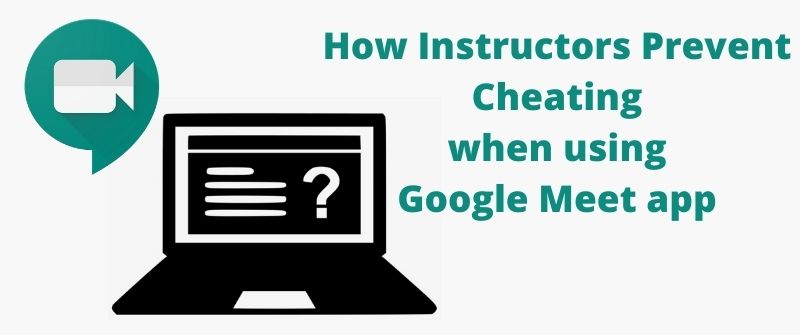With the increased demand for online exam tools in education, instructors who do not have dedicated learning and assessment systems tend to use free online meeting tools and apps. Apart from Zoom, Google Meet is another common one.
Most universities allow instructors to use Google Meet to teach their online classes and sometimes even to take exams or small assessment tasks. While on it, professors seek to monitor all the activities that take place in the on-class environment.
However, students tend to use this gap as an opportunity to try cheeky and perhaps canning methods to cheat in their exams. Some may not be attentive in class, which is a concern for the rest of the instructors.
This begs the question of whether Google Meet can detect such behavior.
As an app, Google Meet cannot detect cheating in exams or tests because it is designed for conducting online meetings.
However, the app allows instructors to view students’ movements through the camera. They can also record video and audio to monitor any unusual behavior from the students.
However, if the professor is keen enough, he or she can use his or her intuition and observation to prevent or detect any chances of students copying or cheating.
Despite that, if the Google Meet app is used alongside Google Classroom, chances of cheating are greatly reduced. This is because Google Classroom is made for learning and testing purposes and has tools for that alongside other online learning tools.

Can Google Meet Detect the Switching of Tabs?
Google Meet cannot detect if you switched tabs unless if you have allowed screen sharing where the instructor views your screen.
Without sharing the screen, it is hard for the instructor to view your apps on the PC or on your phone. However, they can monitor your movements via the camera, which can tell your behavior.
By using Google Meet for online tests or exams, the ability to detect cheating is left to the instructor. This is because the app does not have dedicated in-app tools to detect cheating such as browser activities.

Having noted that, it’s good to know if cheating is possible on Google Meet. Let us now explore whether some cheeky or canning students can manage to successfully cheat if at all they can.
Can students cheat in Google Meet exams?
One of the most sensitive issues about Google Meet is cheating during the exam period. For instance, one of the most incredible loopholes that makes the students cheat is switching off the camera.
If monitored well, students cannot cheat on Google Meet because the professor is watching their activities through the webcam.
If the screen is shared, they cannot cheat because the instructor can monitor students’ browsers. However, if not well-proctored, students will try to cheat, and it may be successful.
A camera is a powerful tool that enables the teacher to understand what is going on in the students’ screens and environments. If it fails to capture any events on the screen of the students, then cheating is possible.

By using the camera, the professors can see their students and monitor their movements.
Therefore, in case they find any fishy behavior, they can ask a student to share his or her screen. If the screen is shared, a professor can see the screen and determine if it is cheating or not.
How professors prevent Cheating in Google Meet classes or exams
Students are becoming clever every day, and they are likely to employ devices. In fact, students use advanced tech devices to cheat on online exams. Fortunately, professors are coming up with an advanced way to prevent cheating during examination sessions.
Without further ado, you can try the following steps to prevent cheating during a live session on Google Meet.
1. Monitoring students via the camera
Allow the student to download the app before the test. Arrange a proper schedule to allow them to create a meeting with you. That is the method that you will be using to interact with them during the examination session.
Furthermore, the professor should ask them to put their phone devices away within the examination sessions.
Additionally, let them share their desktop or video with you. Sharing their desktop and video is foolproof that you are accessing everything they are doing during the exam session.
For instance, if the students open up the web page, you will be watching. You will also see when they wake up or talk to someone.
2. Prohibiting Phones in Exams
This is perhaps one of the ways that every university or educational institution applies to present cheating in online exams. The use of phones is common where students use them to search for answers online.
As a result, phones are loopholes that they use to share information and eventually cheat on you. Keeping away such gadgets is sure proof that they will not attempt to cheat in the full glare of your eyes.
3. Make different versions
The professor can still prevent cheating by making different versions of assessment tests. That could be online tests or paper tests by creating different versions of multiple questions without letting the students know about this trick.
From the kind of an answer, you get, you can tell the kind of student who was peeping and probably copying answers.
A professor may opt to let the student know that he has different versions of the test for any student. That will automatically discourage lazy students from cheating in the first place.
4. Checking for Plagiarism

Plagiarized work is a key indicator of theft. You should set the assignment for your students and let them submit it on time.
After that, you should check for the originality of the content by using a plagiarism checker.
Copy-pasting is one of the ways students cheat in class assignments and even in exams. Therefore, scanning their work is important.
If you find a high percentage of similarity, you should have a concrete reason to believe that the student used a shortcut to acquire the information.
5. Setting Essay Exams
Writing an essay is a common scenario in college work. The essay comes to evaluate a student’s understanding of a specific topic in focus.
Lazy students have a tendency to copy word to words from other hardworking students without minding the consequences.
If you get similar versions of an essay, it is a perfect indicator that they are copied from a single source. An essay should be original and unique to prove credibility.
6. Monitoring Students’ Movements
You can determine if the student is cheating in the examination room by watching their movement. However, just like in Zoom exams, Google Meet does not allow a lot of monitoring of student movements.
For instance, a cheating student may be peeping the eyes to the work of a fellow student and copying some elements.
An unstable student is always nervous, especially when you make direct eye conduct, which is evident that something wrong is in the offing.
7. Setting Application questions and not theory
Students are fond of cramming every word that they may come across. In the end, they only recite the answers from their mind to prove their worth.
As a lecturer, you can end that trend by setting application questions. Such a format requires a student to change the approach and deal with the question in a real-life situation.
In the process, you will be getting unique answers that are free of cramming and copying from other materials.
8. Switch the seating arrangement
During an examination session, you can decide to shuffle how the student will be seated.
Suppose there was a student who wanted to have an edge when seated with a friend that only disorganizes the game. The victim will not have a free hand in coordinating theft as expected.
9. Talk about integrity and honesty.
As a professor, you should talk to your students about the importance of sticking to honesty and integrity. They should learn the consequences of cheating in exams and understand how such actions may affect their courses if caught up.

